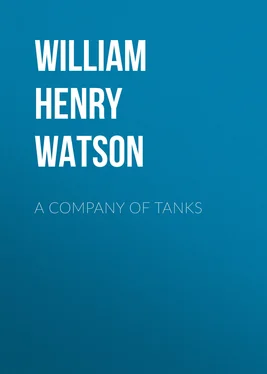William Henry Lowe Watson - A Company of Tanks
Здесь есть возможность читать онлайн «William Henry Lowe Watson - A Company of Tanks» — ознакомительный отрывок электронной книги совершенно бесплатно, а после прочтения отрывка купить полную версию. В некоторых случаях можно слушать аудио, скачать через торрент в формате fb2 и присутствует краткое содержание. Жанр: foreign_prose, История, foreign_edu, foreign_antique, на английском языке. Описание произведения, (предисловие) а так же отзывы посетителей доступны на портале библиотеки ЛибКат.
- Название:A Company of Tanks
- Автор:
- Жанр:
- Год:неизвестен
- ISBN:нет данных
- Рейтинг книги:3 / 5. Голосов: 1
-
Избранное:Добавить в избранное
- Отзывы:
-
Ваша оценка:
- 60
- 1
- 2
- 3
- 4
- 5
A Company of Tanks: краткое содержание, описание и аннотация
Предлагаем к чтению аннотацию, описание, краткое содержание или предисловие (зависит от того, что написал сам автор книги «A Company of Tanks»). Если вы не нашли необходимую информацию о книге — напишите в комментариях, мы постараемся отыскать её.
A Company of Tanks — читать онлайн ознакомительный отрывок
Ниже представлен текст книги, разбитый по страницам. Система сохранения места последней прочитанной страницы, позволяет с удобством читать онлайн бесплатно книгу «A Company of Tanks», без необходимости каждый раз заново искать на чём Вы остановились. Поставьте закладку, и сможете в любой момент перейти на страницу, на которой закончили чтение.
Интервал:
Закладка:
The colonel allowed me to explain the scheme myself. All my suggestions were accepted; but the concentration of men and guns that I had imagined in my dreams was made impossible by the fact that General Gough had ordered the attack for the morrow.
I took the colonel's car and tore back to Behagnies. I wrote out my orders while Jumbo, helped by two reconnaissance officers who were attached to us for instruction, rapidly marked and coloured maps for the tank commanders. My orders reached Swears, who was in charge at Mory Copse, by 6.30 P.M., and by 8 P.M. the tanks were clear of the quarry.
After dark I walked down the Bapaume road and presented myself at the headquarters of the Australian Division, with which my tanks were operating. It was a pitch-black night. The rain was turning to sleet.
Divisional Headquarters were in "Armstrong" or small canvas huts, draughty and cold. I discussed the coming battle with the staff of the Division and Osborne, the G.S.O. II. of the Corps. We turned in for a snatch of sleep, and I woke with a start—dreaming that my tanks had fallen over a cliff into the sea. At midnight I went to the door of the hut and looked out. A gale was blowing, and sleet was mingled with snow. After midnight I waited anxiously for news of my tanks. It was a long trek for one night, and, as we had drawn them so recently, I could not guarantee, from experience, their mechanical condition. There was no margin of time for any except running repairs.
At one o'clock still no news had come. The tanks had orders to telephone to me immediately they came to Noreuil, and from Noreuil to the starting-point was at least a ninety-minutes' run.
By two o'clock everybody was asking me for information. Brigade Headquarters at Noreuil had neither seen tanks nor heard them, but they sent out orderlies to look for them in case they had lost their way. At Noreuil it was snowing hard, and blowing a full gale.
My position was not pleasant. The attack was set for dawn. The infantry had already gone forward to the railway embankment, from which they would "jump off." In daylight they could neither remain at the embankment nor retire over exposed ground without heavy shelling. It was half-past two. I was penned in a hut with a couple of staff officers, who, naturally enough, were irritated and gloomy. I could do nothing.
The attack was postponed for an hour. Still no news of the tanks. The faintest glimmerings of dawn appeared when the telephone-bell rang. The Australian handed me the receiver with a smile of relief.
"It's one of your men," he said.
I heard Wyatt's tired voice.
"We are two miles short of Noreuil in the valley. We have been wandering on the downs in a heavy snowstorm. We never quite lost our way, but it was almost impossible to keep the tanks together. I will send in a report. The men are dead-tired."
"How long will it take to get to the starting-point?" I asked.
"An hour and a half at least," he replied wearily.
"Stand by for orders."
It was 1¼ hours before zero. The men were dead-tired. The tanks had been running all night. But the Australians were out on the railway embankment and dawn was breaking.
I went to see the General, and explained the situation briefly.
"What will happen to your tanks if I put back zero another hour and we attack in daylight?" he asked.
"My tanks will be useless," I replied. "They will be hit before they reach the German trenches—particularly against a background of snow."
He looked at his watch and glanced through the window at the growing light.
"It can't be helped. We must postpone the show. I think there is just time to get the boys back. Send B. to me."
I called up Wyatt and told him that the men were to be given a little sleep. The officers, after a short rest, were to reconnoitre forward. I heard orders given for the Australians to come back from the railway embankment—later I learned that this was done with practically no casualties—then I stumbled down the road to tell the colonel.
I found him shaving.
"The tanks lost their way in a snowstorm and arrived late at Noreuil. The attack was postponed."
He looked grave for a moment, but continued his shaving.
"Go and have some breakfast," he said cheerily. "You must be hungry. We'll talk it over later."
So I went and had some breakfast....
CHAPTER IV.
THE FIRST BATTLE OF BULLECOURT.
( April 11, 1917. )
Later in the morning we heard from Jumbo, who had returned from Noreuil, the full history of the weary trek in the blizzard.
The tanks had left Mory Copse at 8 P.M. under the guidance of Wyatt. In the original plan of operations it had been arranged that Wyatt's section should attack from Noreuil and the remaining sections from Ecoust. So Wyatt was the only section commander who had reconnoitred the Noreuil route.
No tape had been laid. We had not wished to decorate the downs with broad white tape before the afternoon of the day on which the tanks would move forward. On the other hand, we had not calculated on such a brief interval between the receipt of orders and the start of the tanks. An attempt to lay tape in front of the tanks was soon abandoned: the drivers could not distinguish it, and Wyatt was guiding them as well as he could.
Soon after they had set out the blizzard came sweeping over the downs, blocking out landmarks and obscuring lamps. The drivers could not always see the officers who were leading their tanks on foot. Each tank commander, blinded and breathless, found it barely possible to follow the tank in front. The pace was reduced to a mere crawl in order to keep the convoy together.
Though Wyatt never lost his way, he wisely proceeded with the utmost caution, checking his route again and again. Our line at the time consisted of scattered posts—there were no trenches—and on such a night it would have been easy enough to lead the whole company of tanks straight into the German wire.
The tanks came down into the valley that runs from Vaulx-Vraucourt to Noreuil two miles above Noreuil. The crews were dead-tired, but they would have gone forward willingly if they could have arrived in time. The rest of the story I have told.
The blizzard confounded many that night. The colonel told me later he had heard that a whole cavalry brigade had spent most of the night wandering over the downs, hopelessly lost. I cannot vouch for the story myself.
In the afternoon (April 10) I was called to a conference at the headquarters of the Australian Division. General Birdwood was there, Major-General Holmes, who commanded the Division with which we were to operate, Brigadier-General Rosenthal, commanding the artillery of the Corps, sundry staff officers, the colonel, and myself.
The conference first discussed the situation on the front of the Third Army. The initial advance had been completely successful, but the German forces were far from defeat, and were continuing to offer a most determined and skilful resistance. We certainly had not broken through yet. The battle, however, was still in its earliest stages; the situation had not crystallised; there was still hope that the enormous pressure of our offensive might cause the enemy line to crumble and disappear. It had been decided, in consequence, to proceed with the postponed attack on Bullecourt, but to overhaul the arrangements which had been improvised to meet an emergency. The original idea of a stealthy and silent attack, led by tanks and supported by a bombardment rather than a barrage, was abandoned after some discussion, and the conference agreed to return to more classical methods.
Two infantry brigades would attack and pierce the Hindenburg Line on the front immediately to the east of Bullecourt. The attack was to be led by tanks under cover of a barrage and a heavy bombardment. Emphasis was laid on the necessity for strong counter-battery work. The right attacking brigade would form a defensive flank in the direction of Quéant, and at the same time endeavour to press through to Riencourt and Hendecourt. The left brigade would work its way down the German trenches into Bullecourt itself. Immediately the village was reached, the British division on the left would extend the front of the attack westwards.
Читать дальшеИнтервал:
Закладка:
Похожие книги на «A Company of Tanks»
Представляем Вашему вниманию похожие книги на «A Company of Tanks» списком для выбора. Мы отобрали схожую по названию и смыслу литературу в надежде предоставить читателям больше вариантов отыскать новые, интересные, ещё непрочитанные произведения.
Обсуждение, отзывы о книге «A Company of Tanks» и просто собственные мнения читателей. Оставьте ваши комментарии, напишите, что Вы думаете о произведении, его смысле или главных героях. Укажите что конкретно понравилось, а что нет, и почему Вы так считаете.












